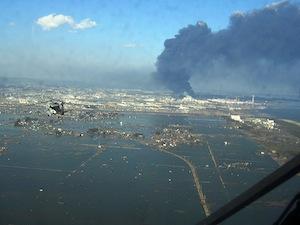Japan’s earthquake and Google’s technology
Photo of Japan after the earthquake (Image by Flickr user Official U.S. Navy Imagery (cc:by))
This story was originally covered by PRI’s The Takeaway. For more, listen to the audio above.
Google may not have been the first international organization to hear about Japan’s recent earthquake, but it wasn’t far off. “We actually have an office in Tokyo and [we] had many Googlers who immediately told us that there was a large earthquake,” Prem Ramaswami, product manager with Google.org’s crisis response team told PRI’s The Takeaway. “We were able to immediately jump into action.”
“Within an hour we had Person Finder up and running and were able to tweet about it,” Ramaswami told The Takeaway. The service collects information about missing people in crisis situations, with the hope of reuniting them with loved ones. “And very soon thereafter, [we] had a landing page up and running so people could start gathering information. And this is basically a resource site that you can reach from google.com or google.co.jp in both Japanese and English.”
Google had provided tools to aid in both the recent floods in Pakistan and the earthquake in Haiti, but the situation in Japan was quite different. “The populating is much more technologically savvy, much more online, much more mobile heavy usage in a place like Japan than in a Pakistan or Haiti,” Ramaswami says. “In Pakistan and Haiti our tools were utilized by a lot of first responders relief agencies and nongovernmental organizations, while in a case like Japan, a lot of the local populous are using our tools to find information and get information from their governments.”
Even with all the increased traffic, the internet may be the best way to get information in a crisis. “Because the Internet itself was built as such an open network, it’s really able to handle the load in a post-disaster situation,” Ramaswami told The Takeaway. “In both New Zealand and Japan most recently, when phone networks and SMS networks get completely clogged up because of the amount of traffic, internet data is still able to successfully pass through.”
And with every crisis, internet companies like Google seems to be getting better at helping. Ramaswami says, “Over the last year we’ve gotten better in our ability to respond in a more quick fashion.”
————————————————————-
“The Takeaway” is a national morning news program, delivering the news and analysis you need to catch up, start your day, and prepare for what’s ahead. The show is a co-production of WNYC and PRI, in editorial collaboration with the BBC, The New York Times Radio, and WGBH.
